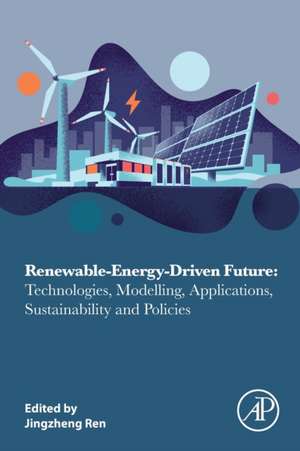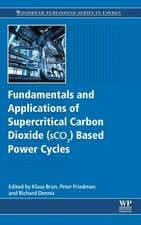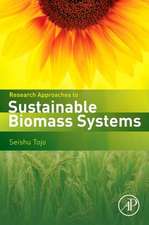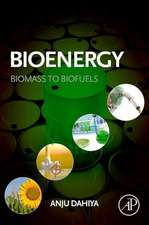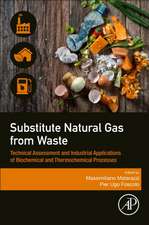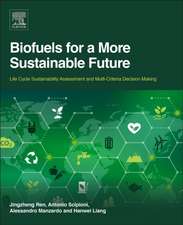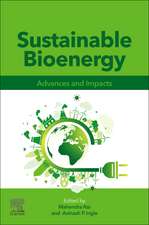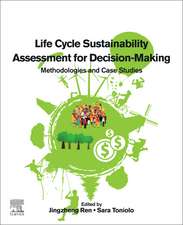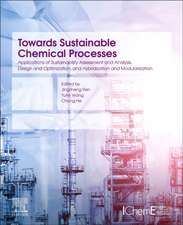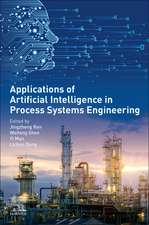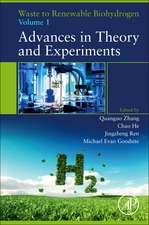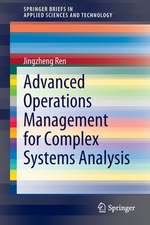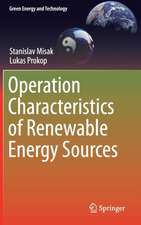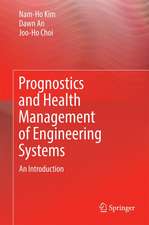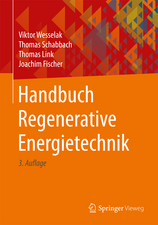Renewable-Energy-Driven Future: Technologies, Modelling, Applications, Sustainability and Policies
Editat de Jingzheng Renen Limba Engleză Paperback – 18 sep 2020
- Presents the advanced renewable-energy-driven technologies and the innovative applications of renewable energy sources
- Develops the models for the efficient use of renewable energy, decision-making and the investigation of its climate and economic benefits
- Investigates the sustainability of renewable energy systems
- Features the regulations and policies of renewable energy
Preț: 757.52 lei
Preț vechi: 972.65 lei
-22% Nou
Puncte Express: 1136
Preț estimativ în valută:
144.97€ • 157.41$ • 121.77£
144.97€ • 157.41$ • 121.77£
Carte tipărită la comandă
Livrare economică 15-29 aprilie
Preluare comenzi: 021 569.72.76
Specificații
ISBN-13: 9780128205396
ISBN-10: 0128205393
Pagini: 636
Dimensiuni: 152 x 229 mm
Greutate: 0.85 kg
Editura: ELSEVIER SCIENCE
ISBN-10: 0128205393
Pagini: 636
Dimensiuni: 152 x 229 mm
Greutate: 0.85 kg
Editura: ELSEVIER SCIENCE
Public țintă
Renewable researchers, academics, engineers; solar/wind power system designers and installers and policy-makersCuprins
Part I: Technologies
1. Solar energy technologies: principles and applications
2. Bioenergy for better sustainability: technologies, challenges and prospects
3. Organic Rankine cycle driven by geothermal heat source: life cycle techno-economic-environmental analysis
4. Renewable energy based trigeneration systems — technologies, challenges and opportunities
5. Integrated power transmission and distribution systems
Part II: Modelling
6. Integrated inexact optimization for hybrid renewable energy systems
7. Large-scale integration of variable renewable resources
8. The climate and economic benefits of developing renewable energy in China
Part III: Applications
9. The utilization of renewable energy for low-carbon buildings
10. Towards a renewable-energy-driven district heating system: key technology, system design and integrated planning
11. Renewable-energy-driven desalination for more water and less carbon
Part IV: Sustainability
12. The environmental performance of hydrogen production pathways based on renewable sources
13. Integrated economic-environmental-social assessment of straw for bioenergy production
14. Sustainability assessment of renewable-energy based hydrogen and ammonia pathways
15. An extended fuzzy divergence measure-based technique for order preference by similarity to ideal solution method for renewable energy investments
16. Multicriteria decision making for the selection of the best renewable energy scenario based on fuzzy inference system
Part V: Policy
17. How much is possible? An integrative study of intermittent and renewables sources deployment. A case study in Brazil
18. Renewable energy technologies: barriers and policy implications
19. Policies for a sustainable energy future: how do renewable energy subsidies work and how can they be improved?
20. Renewable energy-based power generation and the contribution to economic growth: the case of Portugal
1. Solar energy technologies: principles and applications
2. Bioenergy for better sustainability: technologies, challenges and prospects
3. Organic Rankine cycle driven by geothermal heat source: life cycle techno-economic-environmental analysis
4. Renewable energy based trigeneration systems — technologies, challenges and opportunities
5. Integrated power transmission and distribution systems
Part II: Modelling
6. Integrated inexact optimization for hybrid renewable energy systems
7. Large-scale integration of variable renewable resources
8. The climate and economic benefits of developing renewable energy in China
Part III: Applications
9. The utilization of renewable energy for low-carbon buildings
10. Towards a renewable-energy-driven district heating system: key technology, system design and integrated planning
11. Renewable-energy-driven desalination for more water and less carbon
Part IV: Sustainability
12. The environmental performance of hydrogen production pathways based on renewable sources
13. Integrated economic-environmental-social assessment of straw for bioenergy production
14. Sustainability assessment of renewable-energy based hydrogen and ammonia pathways
15. An extended fuzzy divergence measure-based technique for order preference by similarity to ideal solution method for renewable energy investments
16. Multicriteria decision making for the selection of the best renewable energy scenario based on fuzzy inference system
Part V: Policy
17. How much is possible? An integrative study of intermittent and renewables sources deployment. A case study in Brazil
18. Renewable energy technologies: barriers and policy implications
19. Policies for a sustainable energy future: how do renewable energy subsidies work and how can they be improved?
20. Renewable energy-based power generation and the contribution to economic growth: the case of Portugal
